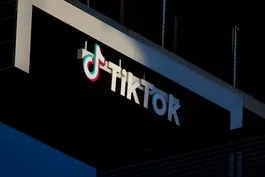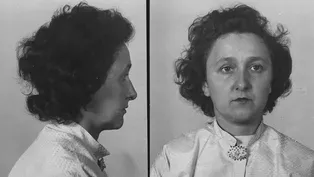
Israel announces last-minute snag in hostage deal with Hamas
Clip: 1/18/2025 | 4m 16sVideo has Closed Captions
Why Netanyahu announced a last-minute snag in Israel-Hamas ceasefire and hostage deal
Just 12 hours before the ceasefire between Israel and Hamas is supposed to go into effect, Israeli Prime Minister Netanyahu said it would not go forward until Hamas made good on its agreement to provide a list of hostages they’re going to release. John Yang speaks with Anshel Pfeffer, Israel correspondent for The Economist, for the latest.
Major corporate funding for the PBS News Hour is provided by BDO, BNSF, Consumer Cellular, American Cruise Lines, and Raymond James. Funding for the PBS NewsHour Weekend is provided by...

Israel announces last-minute snag in hostage deal with Hamas
Clip: 1/18/2025 | 4m 16sVideo has Closed Captions
Just 12 hours before the ceasefire between Israel and Hamas is supposed to go into effect, Israeli Prime Minister Netanyahu said it would not go forward until Hamas made good on its agreement to provide a list of hostages they’re going to release. John Yang speaks with Anshel Pfeffer, Israel correspondent for The Economist, for the latest.
How to Watch PBS News Hour
PBS News Hour is available to stream on pbs.org and the free PBS App, available on iPhone, Apple TV, Android TV, Android smartphones, Amazon Fire TV, Amazon Fire Tablet, Roku, Samsung Smart TV, and Vizio.
Providing Support for PBS.org
Learn Moreabout PBS online sponsorshipJOHN YANG: Good evening.
I'm John Yang.
Just 12 hours before the ceasefire between Hamas and Israel is to go into effect, Israeli Prime Minister Benjamin Netanyahu said it would not go forward until Hamas made good on its agreement to provide a list of the hostages they're going to release.
Netanyahu also said that Israel could resume fighting if negotiations over future steps faltered, a position, he said, that had the support of President-elect Trump.
BENJAMIN NETANYAHU, Israeli Prime Minister (through translator): As soon as he was elected, President Trump engaged in the mission of freeing hostages.
He spoke with me on Wednesday evening and welcomed the agreement and rightly emphasized that the first step of the agreement is a temporary ceasefire.
We reserve the right to return to war if necessary with the backing of the United States.
JOHN YANG: Even as Netanyahu spoke, the Israeli military prepared to receive hostages and to deliver much needed aid to Gaza devastated by 15 months of war.
Anshel Pfeffer is the Israel correspondent for The Economist.
Mr. Pfeffer, Netanyahu saying he can't move forward without this list from Hamas.
Is this just a hiccup or is this something more serious?
ANSHEL PFEFFER, Israeli Correspondent, The Economist: Well, based on what we saw back in November 23, when we had the previous large release of hostages, this is the kind of perhaps technical glitch or a last minute attempt by Hamas to exert some kind of psychological warfare on the Israeli public.
But usually the lists are handed in on time.
And as we saw back then Netanyahu speak, I think once the deal has been signed, we will start seeing, hopefully tomorrow, hostages being released and the ceasefire, at least the first stage of the ceasefire taking place.
JOHN YANG: Walk us through this.
You say the first stage.
It's supposed to have several phases.
What's supposed to happen in this first phase?
That's supposed to begin tomorrow.
ANSHEL PFEFFER: So this is a six-week phase in which there'll be every week a number of Israeli hostages will be released in return.
Israel released dozens of Palestinian prisoners from its jails and on the ground in Gaza, the Israeli army will stop firing, will stop attacking Hamas targets and there will be a gradual withdrawal of Israeli forces, not a total withdrawal in this phase.
And also gradually, Palestinians who are displaced by the war will be allowed to return to their homes, or what's left of their homes.
There's also supposed to be talks between Israel and Hamas over the next stage, which is a comprehensive full ceasefire.
And also for the third stage, which is a reconstruction of Gaza.
JOHN YANG: What are the challenges about this getting to that second stage, which sounds much tougher for a complete withdrawal from Gaza?
ANSHEL PFEFFER: Israel is back on the borders of Gaza.
There's a question of what kind of security guarantees, what kind of security arrangements will be in place.
From Hamas's perspective, there's a question of does it assume full control of Gaza again?
Will there be perhaps an alternative Palestinian force coming in to work on security?
There are other partners as well.
Egypt has a border with Gaza.
What's the status going to be on the border crossing between Egypt and Gaza, which currently Israel controls?
If Israel isn't there, does Hamas control it?
Does someone else?
Does the Palestinian Authority move in and control it?
All these things will continue to be the subject of the talks and there's a lot of potential there for things to go wrong.
And that move from the first to the second stage is what everybody's looking now that's really fraught with difficulty.
JOHN YANG: And what are the Israeli pledges on aid for Gaza?
ANSHEL PFEFFER: According to the deal, 600 trucks a day are to bring aid into Gaza.
So that's basically returning to the pre-October 7th levels even a bit higher because some of the capacity food in Gaza isn't there anymore and therefore there's a higher need of aid.
But once again, this is something very temporary.
We're talking here about 42 days in which there will be, there is a guarantee of the aid going in.
The question is what happens next.
JOHN YANG: Anshel Pfeffer, The Economist in Israel, thank you very much.
ANSHEL PFEFFER: Thanks for having me.
How hormone therapy for menopause got a bad reputation
Video has Closed Captions
How a decades-old study gave hormone therapy for menopause a bad reputation (7m 27s)
News Wrap: TikTok plans to go dark in the U.S. on Sunday
Video has Closed Captions
News Wrap: TikTok plans to go dark in the U.S. on Sunday when ban takes effect (3m 3s)
Why Ethel Rosenberg’s family is pushing for her exoneration
Video has Closed Captions
Ethel Rosenberg’s family pushes Biden to exonerate her decades after her execution (7m 48s)
Providing Support for PBS.org
Learn Moreabout PBS online sponsorshipMajor corporate funding for the PBS News Hour is provided by BDO, BNSF, Consumer Cellular, American Cruise Lines, and Raymond James. Funding for the PBS NewsHour Weekend is provided by...















